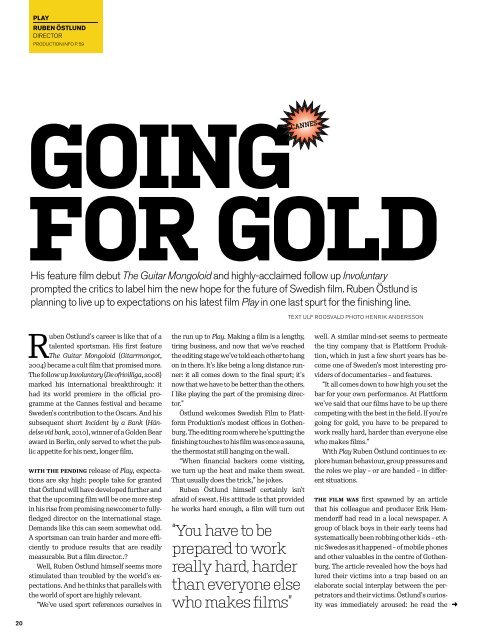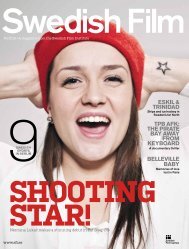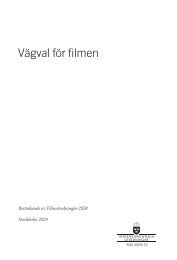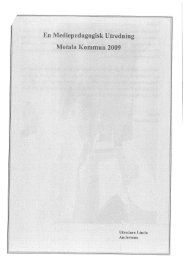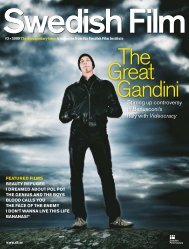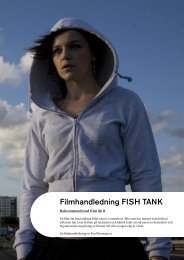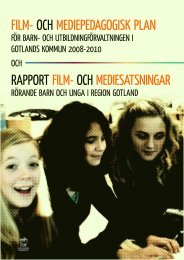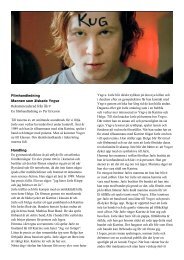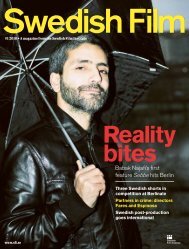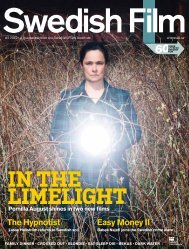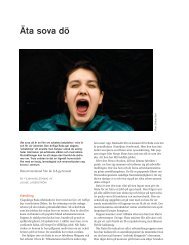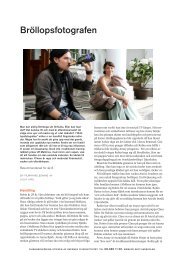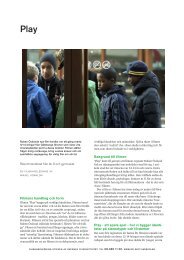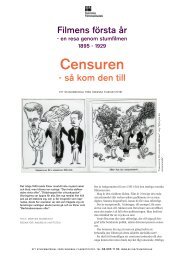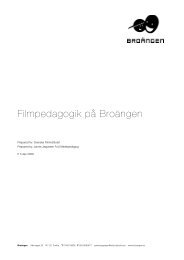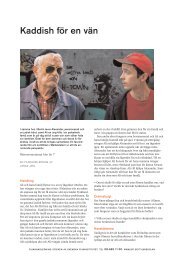Babes and booze - Swedish Film Institute
Babes and booze - Swedish Film Institute
Babes and booze - Swedish Film Institute
You also want an ePaper? Increase the reach of your titles
YUMPU automatically turns print PDFs into web optimized ePapers that Google loves.
20<br />
PlaY<br />
Ruben Östlund<br />
DIRECTOR<br />
PRODUCTION INFO P. 59<br />
GoinG<br />
For Gold<br />
His feature film debut The Guitar Mongoloid <strong>and</strong> highly-acclaimed follow up Involuntary<br />
prompted the critics to label him the new hope for the future of <strong>Swedish</strong> film. Ruben Östlund is<br />
planning to live up to expectations on his latest film Play in one last spurt for the finishing line.<br />
Ruben Östlund’s career is like that of a<br />
talented sportsman. His first feature<br />
The Guitar Mongoloid (Gitarrmongot,<br />
2004) became a cult film that promised more.<br />
The follow up Involuntary (De ofrivilliga, 2008)<br />
marked his international breakthrough: it<br />
had its world premiere in the official programme<br />
at the Cannes festival <strong>and</strong> became<br />
Sweden’s contribution to the Oscars. And his<br />
subsequent short Incident by a Bank (Händelse<br />
vid bank, 2010), winner of a Golden Bear<br />
award in Berlin, only served to whet the public<br />
appetite for his next, longer film.<br />
wiTh The pending release of Play, expectations<br />
are sky high: people take for granted<br />
that Östlund will have developed further <strong>and</strong><br />
that the upcoming film will be one more step<br />
in his rise from promising newcomer to fullyfledged<br />
director on the international stage.<br />
Dem<strong>and</strong>s like this can seem somewhat odd.<br />
A sportsman can train harder <strong>and</strong> more efficiently<br />
to produce results that are readily<br />
measurable. But a film director..?<br />
Well, Ruben Östlund himself seems more<br />
stimulated than troubled by the world’s expectations.<br />
And he thinks that parallels with<br />
the world of sport are highly relevant.<br />
“We’ve used sport references ourselves in<br />
CannES<br />
the run up to Play. Making a film is a lengthy,<br />
tiring business, <strong>and</strong> now that we’ve reached<br />
the editing stage we’ve told each other to hang<br />
on in there. It’s like being a long distance runner:<br />
it all comes down to the final spurt; it’s<br />
now that we have to be better than the others.<br />
I like playing the part of the promising director.”<br />
Östlund welcomes <strong>Swedish</strong> <strong>Film</strong> to Plattform<br />
Produktion’s modest offices in Gothenburg.<br />
The editing room where he’s putting the<br />
finishing touches to his film was once a sauna,<br />
the thermostat still hanging on the wall.<br />
“When financial backers come visiting,<br />
we turn up the heat <strong>and</strong> make them sweat.<br />
That usually does the trick,” he jokes.<br />
Ruben Östlund himself certainly isn’t<br />
afraid of sweat. His attitude is that provided<br />
he works hard enough, a film will turn out<br />
“You have to be<br />
prepared to work<br />
really hard, harder<br />
than everyone else<br />
who makes films”<br />
TExT ULF ROOSVALD PHOTO HENRIK ANDERSSON<br />
well. A similar mind-set seems to permeate<br />
the tiny company that is Plattform Produktion,<br />
which in just a few short years has become<br />
one of Sweden’s most interesting providers<br />
of documentaries – <strong>and</strong> features.<br />
“It all comes down to how high you set the<br />
bar for your own performance. At Plattform<br />
we’ve said that our films have to be up there<br />
competing with the best in the field. If you’re<br />
going for gold, you have to be prepared to<br />
work really hard, harder than everyone else<br />
who makes films.”<br />
With Play Ruben Östlund continues to explore<br />
human behaviour, group pressures <strong>and</strong><br />
the roles we play – or are h<strong>and</strong>ed – in different<br />
situations.<br />
The film waS first spawned by an article<br />
that his colleague <strong>and</strong> producer Erik Hemmendorff<br />
had read in a local newspaper. A<br />
group of black boys in their early teens had<br />
systematically been robbing other kids – ethnic<br />
Swedes as it happened – of mobile phones<br />
<strong>and</strong> other valuables in the centre of Gothenburg.<br />
The article revealed how the boys had<br />
lured their victims into a trap based on an<br />
elaborate social interplay between the perpetrators<br />
<strong>and</strong> their victims. Östlund’s curiosity<br />
was immediately aroused: he read the


